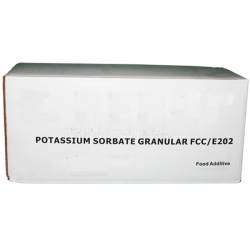No products in the cart.
Active filters
E202-POTASSIUM SORBATE
Potassium sorbate (E202) is a potassium salt of sorbic acid. It is commonly used as a food preservative to inhibit the growth of molds and yeasts, thereby helping to extend the shelf life of foods.
E211-SODIUM BENZOATE
Sodium benzoate (E211) is a widely used food preservative in the food industry to extend the shelf life of products.
E200-SORBIC ACID
Sorbic acid is an additive used as an antifungal agent and as a preservative (E200) for fruits and vegetables. Therefore, it can be found in various food products based on fruits and vegetables (yogurts, cider, etc.) as well as in light mayonnaises and margarines.
SODIUM ASCORBATE
Sodium ascorbate is a potent antioxidant; it is widely used in the food industry for food preservation.
PROPIONIC ACID
Propionic Acid, is a food preservative widely used for its antifungal and antibacterial properties. It is commonly added to various food products to extend their shelf life and prevent the growth of undesirable molds and bacteria.
SODIUM PROPIONATE
Sodium propionate (E281) is a sodium salt of propionic acid, a carboxylic acid. It is used as a food additive in the food industry, primarily as a preservative agent to inhibit the growth of molds and yeasts, thereby extending the shelf life of food products.
E282-CALCIUM PROPIONATE
Calcium propionate (E282) is a calcium salt of propionic acid. It is used as a food additive in the food industry for its antifungal and antibacterial properties, thereby helping to extend the shelf life of food products.
Sodium Bicarbonate
Sodium Bicarbonate is odorless and salty, easily soluble in water, insoluble in alcohol, with a slight alkalinity. It decomposes when heated and in humid air.
AMMONIUM BICARBONATE
Ammonium bicarbonate (NH₄HCO₃) is an ammonium bicarbonate salt. It appears as a white powder. This food additive dissolves in water, making it alkaline (basic). Ammonium bicarbonate is also referred to as ammonium acid carbonate or ammonium hydrogen carbonate.
E355 - Adipic Acid
Adipic Acid is naturally found in rhubarb and beets. It can also be produced synthetically for industrial use. It is a relatively mild acidifier, permitted in a very limited range of products.
E331-SODIUM CITRATE
Sodium citrate is the sodium salt of citric acid (E330), a natural acid found in most fruits. On an industrial scale, it is produced by cultivating a fungus (Aspergillus niger) in a sugary nutrient solution.
E170 - Calcium Carbonate
Calcium carbonate is composed of carbonate ions and calcium ions. This white substance has a molar mass of 100.1 g/mol. Calcium carbonate is the major compound found in limestones like chalk, but also in marble.
POTASSIUM NITRATE
Preservative, mineral, or synthetic, used in meat-based products.
ORTHOPHOSPHORIC ACID
It is a trifunctional oxoacid (triassic) of significance in inorganic chemistry and fundamental in biochemistry. This mineral acid is obtained either through the treatment of phosphate rocks or by burning phosphorus. At room temperature, phosphoric acid is a crystalline solid with a density of 1.83, and it melts at 42.35°C.
E452 - Polyphosphates
Polyphosphates are chemical compounds belonging to the polyphosphate family. They are used in various industrial applications, including the food industry.
VITAMIN A
Vitamin A is a fat-soluble vitamin stored in our liver. It contributes to the natural development and normal growth of the body while maintaining the health of our eyes, skin, and immune system.

































































